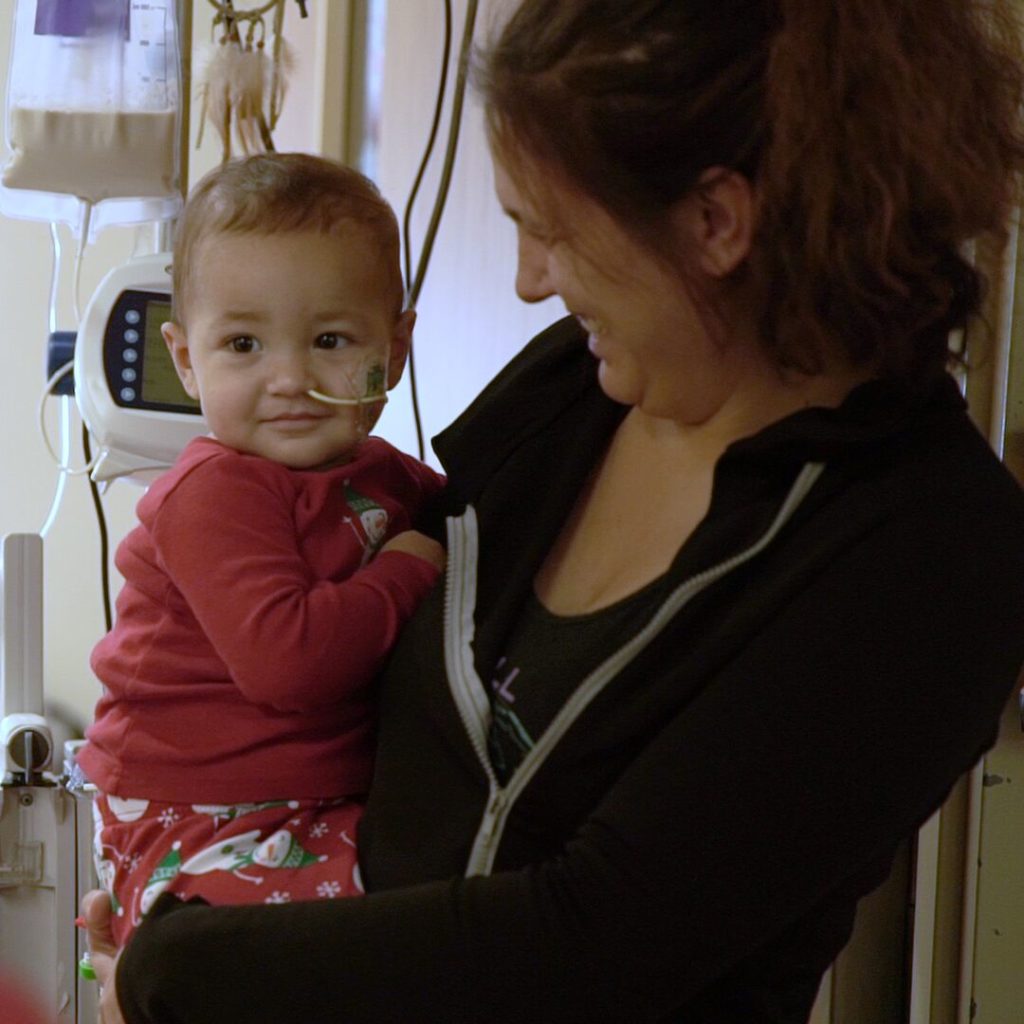
Delivering palliative care to children at home
A family’s story
Rylee was diagnosed with a type of blood cancer called acute myeloid leukemia at 18 months old. She bravely endured chemotherapy, a bone marrow transplant, clinical trials, blood transfusions, and other treatments, but despite all efforts, Rylee’s cancer persisted. It became clear it was not going away. After spending almost half of her life battling cancer, Rylee’s parents Jayson and Ashley decided to take her home in early September 2018.
During this difficult time, virtual appointments (appointments conducted through a device like a laptop or tablet, instead of in-person) allowed the family to connect with Dr. Dave Lysecki, Rylee’s palliative care specialist at McMaster Children’s Hospital from the comfort of their homes.
On these days, Rylee didn’t have to use her car seat, which caused her pain, to make trips to the hospital. It also allowed both mom and dad, who are separated, to participate in the discussion from different homes. During these video chats, they would talk about options for managing Rylee’s pain, learn about changes in her condition, and adjust the care plan as needed.
Originally, the virtual visits were just once a week. “But as we progressed so quickly, it became multiple days a week,” says Ashley. While Rylee’s care became increasingly complex, virtual care kept her in constant contact with her specialist. Rylee was able to be at home for most of the last two months of her life, including at the time of her death.
Virtual appointments
Rylee’s family is one of about two dozen in the program who have taken part in virtual visits since the project began last year. These “e-visits,” or “virtual visits,” are part of a pilot program run by the province through the Ontario Telemedicine Network. The patient or family member is invited to their appointment through email. Once they click the link on their device, they are connected with the doctor in a video chat.
Virtual appointments are often done in the presence of home care nurses, community care coordinators or a family physician. The specialist can join the call while the patient is at home, making follow-up care much more efficient. Some scenarios still require an in-person appointment, such as physical exams, bloodwork, and x-rays. For Rylee, she continued to come to clinic appointments for treatments like blood transfusions. But when she could stay home, she did.
A highly accessible team
“Virtual care has dramatically expanded our ability to respond with timely, high-quality care,” says Dr. Lysecki. With a team cellphone and team email address, accessibility is a priority. A family can page, call, text, or write asking for support and someone will respond.
Depending on the urgency of the request, the timeline could be same day or later that week. There is someone available at all times on service. For Rylee’s family, this meant that even on evenings, weekends, and holidays, reaching out to the team allowed the on-call specialist to make a virtual house call with no lag time. Rylee’s physician was able to see her, speak to her parents, review her equipment and chart, and change her care plan in moments.
“There were times in the middle of the night when I’d be hitting the button for Rylee’s pain medication and it would lock me out,” says Ashley. “I’d be texting Dave at two or three in the morning asking what to do. He would reply right away. By the next morning when I woke up, he had a plan. Having somebody there instead of going to the hospital was such a life saver.”
For some, coming into the hospital can be a big ordeal. Virtual visits benefit different families in different ways. Some families of children with wheelchairs don’t have accessible vehicles. Others would need to work around home nursing schedules. E-visits are also beneficial for children whose parents live in different homes so they can be on the same phone call, getting the same information.
Palliative care
Dr. Lysecki leads the Quality of Life and Advanced Care program at McMaster Children’s Hospital, providing pediatric palliative care services to patients across the region. The program helps reduce the burden of serious health conditions on children and their families. It helps them manage symptoms and make the most out of life. Each child’s journey is unique, so this care may last days, years, or even decades.
For patients nearing the end of their life, spending as much time at home instead of in hospital means the world to them and their families. It’s also a top priority for healthcare providers. The goal of palliative care is to help patients with life-threatening and life-limiting conditions maintain the best possible quality of life. Receiving care at home whenever possible can make a big difference.

